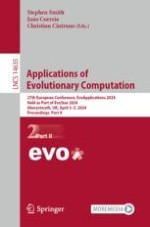2024 | OriginalPaper | Buchkapitel
Evolving Reservoirs for Meta Reinforcement Learning
verfasst von : Corentin Léger, Gautier Hamon, Eleni Nisioti, Xavier Hinaut, Clément Moulin-Frier
Erschienen in: Applications of Evolutionary Computation
Verlag: Springer Nature Switzerland
Aktivieren Sie unsere intelligente Suche, um passende Fachinhalte oder Patente zu finden.
Wählen Sie Textabschnitte aus um mit Künstlicher Intelligenz passenden Patente zu finden. powered by
Markieren Sie Textabschnitte, um KI-gestützt weitere passende Inhalte zu finden. powered by
